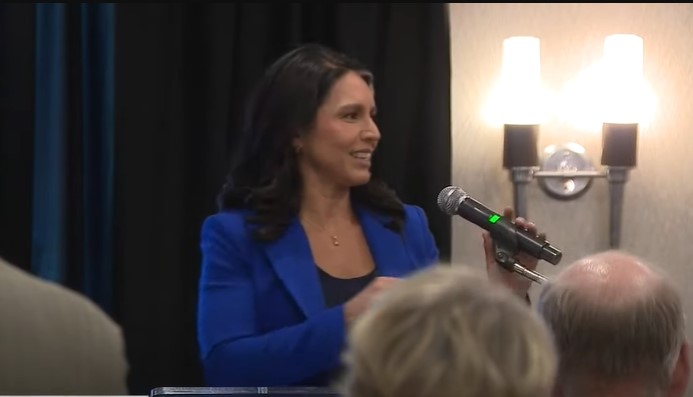
The political career of Tulsi Gabbard has consistently drawn public interest, largely due to her independent-minded approach, military background, and her unconventional stances on foreign policy. Now, trending queries have raised the question of whether she might be considered for a cabinet-level role, specifically as Director of National Intelligence (DNI).
Who is Tulsi Gabbard?
Tulsi Gabbard is a prominent American politician, former U.S. Representative from Hawaii, and a veteran of the U.S. Army National Guard. Her career has been marked by a number of significant milestones:
- Early Political Career: Gabbard’s rise in politics began when she was elected to the Hawaii State Legislature in 2002 at the age of 21, making her the youngest woman ever elected to a U.S. state legislature.
- Military Service: She served two tours of duty in the Middle East as a member of the Hawaii Army National Guard and has attained the rank of Major.
- U.S. Congress: Gabbard served as a U.S. Representative from Hawaii’s 2nd congressional district from 2013 to 2021. During her tenure, she was known for her strong stance on anti-interventionism, skepticism of regime-change wars, and advocacy for veterans’ rights.
- Presidential Candidacy: Gabbard made headlines as a Democratic candidate in the 2020 presidential election, presenting herself as a progressive outsider with a unique, non-interventionist foreign policy agenda.
Gabbard has taken politically unorthodox stances within the Democratic Party, including criticism of U.S. involvement in conflicts such as those in Syria and Iraq. Her commitment to an independent worldview has earned her support across the political spectrum, fueling speculation about potential cabinet roles under both Democratic and Republican administrations.
What is the Director of National Intelligence?
The Director of National Intelligence (DNI) is one of the most critical roles in the U.S. intelligence and national security community. Created in the aftermath of the 9/11 attacks as part of the Intelligence Reform and Terrorism Prevention Act of 2004, the DNI oversees and coordinates all 18 elements of the U.S. Intelligence Community (IC), including the CIA, NSA, and FBI’s intelligence activities.
Key Responsibilities of the DNI:
- Intelligence Oversight and Coordination: The DNI ensures that all intelligence-gathering agencies work collaboratively, providing comprehensive, accurate, and timely intelligence to policymakers.
- President’s Daily Briefing: The DNI is responsible for delivering the daily intelligence brief to the President of the United States, making the role crucial in shaping national security decisions.
- Strategic Intelligence Planning: The DNI sets long-term objectives for U.S. intelligence and develops strategic frameworks to respond to evolving global threats.
- National Security Council: As a cabinet-level official, the DNI sits on the National Security Council, providing direct input into major national security and foreign policy decisions.
The role is inherently complex and requires a deep understanding of intelligence operations, diplomacy, and global security threats. The DNI must also manage interagency cooperation, an essential skill given the different approaches and sometimes competing objectives within various intelligence agencies.
Could Tulsi Gabbard Be a Good Fit for the DNI Role?
The possibility of Tulsi Gabbard serving as Director of National Intelligence is speculative yet intriguing. To assess her potential for this position, let’s consider her qualifications, strengths, and the unique perspective she would bring.
1. Military and Foreign Policy Experience
- Gabbard’s military service gives her an insider’s perspective on national security, particularly in relation to the Middle East, which remains a focal point of U.S. intelligence. Her firsthand understanding of the challenges faced by military personnel adds credibility to her approach to both policy and intelligence.
- Her foreign policy stance, particularly her opposition to “regime change wars,” aligns with a non-interventionist approach that would prioritize intelligence-led insights over military solutions, offering a fresh perspective on how the U.S. engages internationally.
2. Bipartisan Appeal
- Gabbard’s bipartisan reputation could help foster trust and cooperation across political lines within the intelligence community. Although she ran as a Democrat, her views resonate with many on the right, including former President Donald Trump, who reportedly considered her for a cabinet position.
- In an era where national security issues are increasingly politicized, Gabbard’s independent streak could help promote neutrality in intelligence analysis, ensuring that recommendations remain data-driven rather than politically motivated.
3. Intelligence Reform Advocate
- Given her criticism of U.S. foreign interventions, Gabbard might push for greater accountability and transparency within the intelligence community. Her focus on reducing American military involvement in foreign conflicts could influence a shift in U.S. intelligence strategies to prioritize diplomacy and soft power over intervention.
- As someone critical of policies that compromise civil liberties, Gabbard might advocate for reforms to improve privacy protections and ethical oversight, aligning with public concerns about the balance between national security and individual rights.
4. Potential Challenges
- The DNI role demands extensive experience in intelligence and national security strategy, which goes beyond Gabbard’s military and legislative background. Critics may argue that her lack of direct experience in intelligence agencies could be a barrier to overseeing complex intelligence operations.
- Her outspoken views may face resistance within intelligence circles accustomed to a more traditional, interventionist stance, potentially creating friction within the community.
Tulsi Gabbard’s Potential Role in a Trump or Republican Cabinet
Gabbard’s alignment with certain aspects of Trump’s foreign policy stance, particularly around non-interventionism, sparked interest during Trump’s administration regarding a possible cabinet role. Although she was ultimately not selected, her compatibility with elements of Trump’s foreign policy and her popularity among some conservatives have kept her name relevant in discussions of future Republican administrations.
The Implications of a Gabbard-Led DNI
If Tulsi Gabbard were appointed as DNI, the intelligence community could experience a unique shift:
- Reduced Military Engagement Abroad: Gabbard’s leadership could signal a pivot away from intelligence strategies focused on military intervention, favoring instead intelligence-led diplomacy and non-military resolutions.
- Enhanced Civil Liberties Protections: Gabbard’s potential reforms may focus on reducing the scope of domestic surveillance and bolstering safeguards for privacy rights, particularly in light of increased scrutiny on government agencies for invasive data practices.
- Focus on Transparency and Accountability: Gabbard’s independent perspective might drive efforts to improve transparency, which would appeal to a public increasingly concerned with government accountability.
Frequently Asked Questions (FAQs)
1. What is the main role of the Director of National Intelligence?
The DNI coordinates intelligence efforts across all U.S. intelligence agencies and provides critical insights to the President and senior policymakers. This role involves overseeing intelligence collection, analysis, and counterintelligence activities to support national security.
2. Why is there speculation about Tulsi Gabbard and a cabinet position?
Due to her military background, independent policy stance, and bipartisan appeal, there has been speculation that Gabbard could be considered for a cabinet role. Her anti-interventionist views align with the perspectives of certain policymakers interested in a less militarized approach to national security.
3. Has Tulsi Gabbard worked in intelligence before?
No, Gabbard’s background includes military service and legislative experience, but she has not held a position within an intelligence agency. However, her military experience and foreign policy knowledge are seen as assets that could contribute to a leadership role in national security.
4. What impact would Gabbard’s leadership have on U.S. intelligence operations?
Her leadership could shift the focus of intelligence strategies, emphasizing diplomacy over intervention and advocating for greater transparency and civil liberties protections. However, it would depend on her approach to working within the intelligence community and her ability to navigate complex security issues.
While the possibility of Tulsi Gabbard becoming Director of National Intelligence is speculative, it raises thought-provoking questions about the future of U.S. intelligence and national security strategy. Gabbard’s unique background, independent political stance, and strong advocacy for reform make her a fascinating potential candidate for a cabinet position, particularly one that could benefit from a fresh perspective.
If appointed, Gabbard would bring a balanced approach, potentially aligning intelligence strategies with diplomacy-first foreign policies and civil liberties protections. Her leadership could usher in a new era for the U.S. intelligence community, prioritizing ethical oversight, bipartisanship, and a strong commitment to transparent government practices.
 Maui News
Maui News





